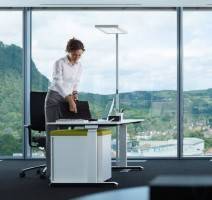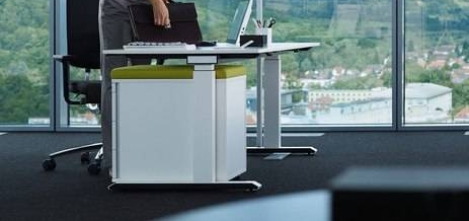October 11, 2015
How biodynamic lighting stimulates sense and performance at work 0
 Biodynamic lighting is an artificial light source that replicates the dynamic variations of daylight and sunlight through a light management system. Up until recent times, it was commonly believed that light was only needed for seeing. However, in 2001, an American scientist, G. C. Brainard discovered a circadian photoreceptor in the retina, which receives a specific quality and quantity of light, and sets the biological clock.* He discovered that light not only provides us with the ability to see, but that light enters the eye via the ‘fourth pathway’, which has a vital non-visual or biological effect on the human body. His studies showed that a certain quantity and quality of light stimulates the biological clock, also known as the circadian rhythm, which regulates hormone levels, particularly melatonin and cortisone, in the body and so plays a vital role in our physical and mental wellbeing.
Biodynamic lighting is an artificial light source that replicates the dynamic variations of daylight and sunlight through a light management system. Up until recent times, it was commonly believed that light was only needed for seeing. However, in 2001, an American scientist, G. C. Brainard discovered a circadian photoreceptor in the retina, which receives a specific quality and quantity of light, and sets the biological clock.* He discovered that light not only provides us with the ability to see, but that light enters the eye via the ‘fourth pathway’, which has a vital non-visual or biological effect on the human body. His studies showed that a certain quantity and quality of light stimulates the biological clock, also known as the circadian rhythm, which regulates hormone levels, particularly melatonin and cortisone, in the body and so plays a vital role in our physical and mental wellbeing.








 This week the UK’s Health Secretary found himself at the centre of a storm because of
This week the UK’s Health Secretary found himself at the centre of a storm because of 




 A new study from US based technology research organisation ABI Research claims that sales of tablets as well as their worldwide user base will start to shrink next year for the first time. According to
A new study from US based technology research organisation ABI Research claims that sales of tablets as well as their worldwide user base will start to shrink next year for the first time. According to 























October 12, 2015
How workplace design is more closely reflecting how we actually work 0
by Adrian Campbell • Comment, Flexible working, Workplace design
More →